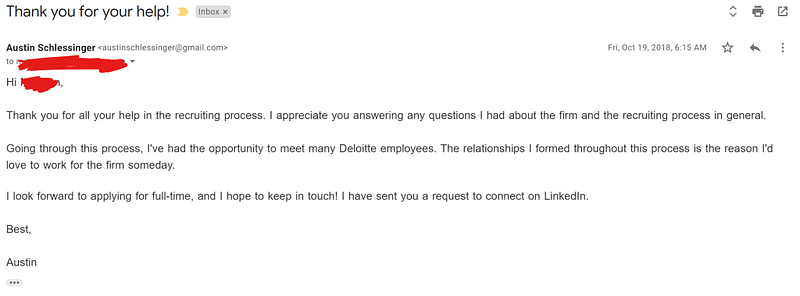
You’ve been rejected
You recently interviewed with a company. Unfortunately, you did not get the job or internship you were applying for. At first you were bummed. “I really want to work for this company. They’ve been on my list for a while and some day I would love to work for them. What should I do?”
I’ve been in your position before. I applied for a summer internship with Deloitte Consulting my junior year. I was rejected. I was so confident I’d get the job. I did everything I could to set myself up for success:
Attended all information sessions
Built my network at the company
Honed my interview skills
Yet, even after doing all these things I didn’t get it. But, even after getting rejected, I still had my heart set on Deloitte. I was determined to get hired for full-time.
You’re determined to get a job
After a lot of work, I was hired full-time at Deloitte Consulting. How did I do it? I maintained the relationships with the people I had connected with at Deloitte.
I kept a good relationship with the recruiter
I connected with the people who had interviewed me
I kept in contact with all the Deloitte practitioners I had met at all of their information sessions
“So, how do I keep up with these relationships even after getting rejected? I mean… they rejected me! That means they don’t want to hear from me. Why would I want to maintain a relationship with someone who didn’t want me to first time around? Why should I waste my time?”
If you really want it, you’re going to do whatever it takes to get it. I’m telling you, if you want a job with a company you’ve already been rejected from, just keep trying. But, you need to emphasize the relationships you have with the people at that company. They are all that matter.
Here’re 3 things you can do after you’ve been rejected to keep the conversation going with the company and set yourself up for success.
1 — Stay positive
Stay confident. Focus on the things you can control, not the things you can’t.
You can’t control whether or not a company hires you.
You can only control your actions. And your actions can help increase the likelihood that a company will hire you. For example, you can:
Check out How to Reapply for a Job When You Have Been Rejected for more info.
For the sake of this article, we will focus on the most important thing when applying for a company that rejected you. Maintaining a good relationship with the company.
2 — Send a message to the recruiter
After you’ve been rejected, shoot your recruiter a message. Your message should contain three things
Thank you for helping me throughout the recruitment process
I am interested in applying again in the future
What can I do to increase my likelihood of getting hired in the future?
If you address these three things, you are golden. You are showing gratification for the time the recruiter spent helping you. You are showing interest in future opportunities. You are asking for advice on how to get a job in the future. It’s kind of like answering the question “What is your greatest weakness?” You identify your weakness or in this case your failure to get a job. And you explain how you are proactively trying to improve yourself to get better or in this case improving to get a job in the future.
Here’s the message I sent to my recruiter after getting rejected my junior year.
If I were to write this again, I’d add something along the lines of: “What skills should I focus on improving to help increase my chances of getting hired for full time.”
3 — Send a message to those who interviewed you
“But I already sent them a follow-up email! Isn’t it weird if I contact them again?” No. Even if they didn’t reply to your follow-up, send them another message. It’s all about touch points. The more more you interact with the company, the better.
If you need help writing a follow-up check out The Best Follow-Up Email
For an idea about what to send after rejection, focus on accomplishing three things
Thank you for interviewing me
I’d like to work for your company one day
What can I do to set myself up for success?
Your communication with your interviewers should be very similar to your message to the recruiter.
By doing these three things, you will increase your chance of getting hired the second time around. Be patient and focus on investing in the relationships you have built.




